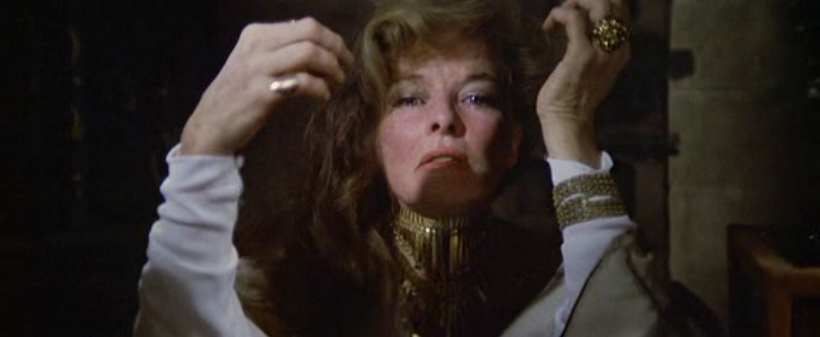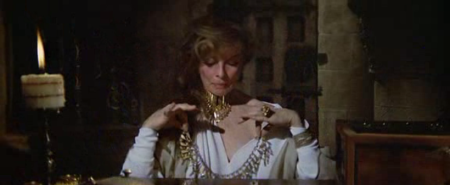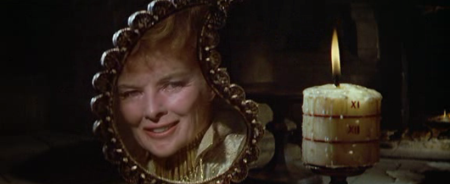Andrew here to kick off a theme week dedicated to my favourite movie related person of all time – Katharine Hepburn. Next Sunday is the 106th birthday of Oscar’s most fêted Actress and this week The Film Experience is devoting time to her with the centrepiece being Wednesday’s “Hit Me With Your Best Shot” devoted to Summertime, her lone David Lean collaboration. (Join us, please.)

I’m starting things off this evening with a monologue from Hepburn’s record making turn in The Lion in Winter. She became the first woman to win a third Best Actress Oscar, and then subsequently broke her own record made it a fourth with On Golden Pond in 1981.
Eponymous lion in winter, Henry, is pondering – which of his remaining three sons deserves to succeed him? Meanwhile, young new King Philip of France is visiting and wants a successor chosen, or he wants his sister, Alais, back along with her dowry. Alas, Alais is currently King Henry's mistress. Adding to the tension, it’s Christmastime and Queen Eleanor is being allowed her sojourn from her prison cell in Windsor for some holiday festivities. So, three princes, a King unwilling to abdicate, a scorned wife, a rival King and a mistress. Let the plotting begin.
This “monologue” is more a series of three (varying in length) with interspersed conversation and it begins somewhere at the one hour mark... Henry has seemingly duped his competitors - instigated a wedding ceremony he knew would never go through, revealed Eleanor's duplicity to her sons and won this round of the battle. He ends his victory with a pointed kiss with Alais in view of his wife. And, Eleanor slinks off to her room. Beaten, for now. Like a number of moments in The Lion in Winter, caught between real drama and biting comedy it’s probably high farce at best. Even though Eleanor does not really live in a prison (she’s simply living an exiled existence at Salisbury Castle) one could well imagine that this eclectic woman spends her alone time musing to herself in lilting soliloquies like the one which follows. It lends a wave of profound sadness to the first part of this scene which Hepburn is careful to never actually play up. Eleanor is sad, but never pathetic.

How beautiful you make me.
She begins, mockingly recalling Henry’s words to Alais.



What might Solomon have sung had he seen this? (picks up mirror) I can't. I'd turn to salt.
The original text for the play reads, describing Eleanor, “She is 61 and looks nothing like it. She is a truly handsome woman of great authority, temperament and presence. She has been a queen of international presence for 46 years and you know it. Finally, she is the most unusual thing: a genuinely feminine woman thoroughly capable of holding her own in a man’s world.” It is as much as a description of Eleanor as it is one of Katharine Hepburn. She’s so perfectly cast as this regal, give or a take a slew of children, an embittered husband and a kingdom to fight over, one does not need to bend imagination to imagine that, yes, this woman is royalty. The legend of Kate endures as much as the actress Kate, but her ability to become legend at a time when so many of the movie legends were men is only further proof of her temerity. At 60 here, Kate still retains that regal beauty that as the audience you scoff to imagine she wouldn’t want to look at her image in the mirror.

I've lost again. I'm done for this time. Well, there'll be other Christmases.

I'd hang you from the nipples, but you'd shock the children.


They kissed sweetly, didn't they? I'll have him next time. I can wait. (Reaches for her crown.) Ah, there you are! My comfort and my company. We're locked in for another year. Four seasons more. What a desolation. What a life's work.
By this point she has drifted, gloriously, into the maudlin and who better than “middle” child Geoffrey to happen up her in her time of despair.
Is it too much? Be sure to squint as you approach. You may be blinded by my beauty.
And, of course we are blinded. Even in a dejected state, this is a Queenly woman. Kate’s post 50s oeuvre is marked by a slew of maternal roles and even as, objectively, her best moments in the film are opposite O’Toole she’s delightful opposite her children – biological and surrogate. A distant Geoffrey (“Never can I remember anything from you warmer than indifference”) is joined by a gloating John and a sullen Richard. I like to think Hopkins became a great actor because his feature film debut was opposite a legend. It's a shame John Castle, excellent as Geoffrey, never became half the star. Eleanor's wallowing is interrupted because she must now deal with her squabbling sons and notso empty threats launch into the middle of this scene with – arguably – the most well-known passage from the film. John pulls a dagger on John who impishly cries, "He's got a knife!"

Of course he has a knife. He always has a knife. We all have knives. It's 1183 and we're barbarians. How clear we make it. Oh, my piglets, we are the origins of war. Not history's forces, nor the times, nor justice, nor the lack of it, nor causes, nor religions, nor ideas, nor kinds of government, nor any other thing. We are the killers. We breed wars. We carry it, like syphilis, inside. Dead bodies rot in field and stream because the living ones are rotten. For the love of God, can't we love one another just a little? That's how peace begins.
The thing with Eleanor is take your pick of expressive female leads in cinema (women who lie to themselves is what Nathaniel would call them) and what Eleanor has in common with them is her penchant for dramatics. One is never certain if this speech is to be taken in earnest or is just another coping strategy for Eleanor as she deals with the fallout of her loss and her children whom she loves and abhors at the same time. Nonetheless, theatrics or not, the power of the lines remain. The ambiguity of Eleanor's sincerity, though, is compounded by the closing quasi-monologue as the scene ends. Youngest John has seemingly won the crown but now he remember; he had planned to team up with King Phillip to overthrow Henry...just in case. What will the roosting lion do when he realises the favourite child of his had planned to overthrow him? The film is moving so quickly we get no time to muse on Eleanor's theatrics, there are things to do! So, off John goes to salvage things and Eleanor again begin to plot on ways to snatch victory from the mouth of the lion in winter. Richard, her favourite, must ascend to the throne. And it seems as if the opening monologue has completed but the scene ends with a beautiful referral to it. Eleanor is alone again, but this time not so maudlin.

I've got the old boy this time. The damn fool thinks he loves John. He believes it. That's where the knife goes in...knives. Knives.
It makes you wonder. For all the earnestness of her speech, Eleanor has no qualms about plotting and scheming to start wars. It is how a Queen in exile spends her time. The mention of the knife again, then, is a nice touch.

Where is that mirror? I'm Eleanor, and I can look at anything. My, what a lovely girl. How could her king have left her?
And the decision to have her return to the mirror is an even better one. What Eleanor hates more than looking at her aging self is looking at an image of herself as a loser. The scene opens with dejectedness but ends with possibility. It’s a moment of potential triumph as she heads off to plan evils, but it still tinges with sadness because prolonged fights and all the thing keeping the film buoyed is the inevitably, the necessity of the relationship between Eleanor and Henry. She may try to better him, but she will still be the exiled Queen. "How could her king have left her" is not just a glib observation on Alais’ ascendance to King’s mistress but in Hepburn's hands becomes a profound rumination on the way that older gals are so often cast aside. It’s one of the eons of reasons Kate endures as an actress for the ages - she defied the norm. It’s difficult to choose if young Kate (pre 1959) or older Kate (1960 and onwards) is the stronger performer but it’s particularly impressive that – defying the sometimes ageist tendencies of stardom – Kate maintained such great heights in her career as she grew older. She did some of her finest work in her late fifties and onwards . We sigh with Eleanor when she asks how Henry could have left her but we smile at Kate, because how could anyone have left her? At 60 she retains all the charm, beauty and elegance of Kate at 30. We couldn’t leave her if we tried. We wouldn’t even dare.
Are you excited for this week's mini-celebration on Katharine Hepburn? How fondly do you remember her Eleanor of Aquitaine?